AMSA Calls Off Search for Missing Vessel
AMSA’s Rescue Coordination Centre (RCC Australia) said it has suspended the search for a 75-meter fishing support vessel after consulting expert medical advice indicating that in the current weather conditions there is no prospect of survival. An emergency beacon signal was detected by AMSA early on Sunday, March 30, in the Southern Indian Ocean near Antarctica about 3,200 km southwest of Perth and 648 km north of the Antarctic mainland in the Australian Search and Rescue Region. AMSA was unable to contact the vessel, and a broadcast to shipping was issued. The broadcast to shipping remains current, AMSA said, but the nearest vessel in communication with is more than 1,800 kilometers away. Yesterday, AMSA tasked a civil jet and a RAAF P3 Orion to locate the vessel.
Russian, Chinese Vessels Freed from Arctic Ice
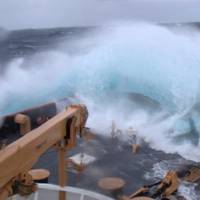
The U.S. Coast Guard Cutter Polar Star was released by the Australian Maritime Safety Authority from search and rescue duties Jan. 7, following confirmation the Russian-Flagged Akademik Shokalskiy and Chinese-Flagged Xue Long are free from the Antarctic ice due to a favorable change in wind conditions. The Coast Guard Pacific Area command center received confirmation from the Australian Maritime Safety Authority at 2 p.m. Pacific Standard Time that both ships broke through the heavy ice, rendering assistance from the Polar Star no longer necessary.
Antarctic Ice-bound Ships Moving: US Rescue Mission Icebreaker Stands Down
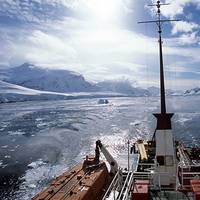
Both the 'Akademik Shokalskiy' and the 'Xue Long' have managed to break free from heavy ice in Commonwealth Bay, Antarctica, informs the Australian Maritime Safety Authority’s (AMSA) Rescue Coordination Centre (RCC Australia). According to the the U.S. Coast Guard, the Cutter Polar Star was released by AMSA from search and rescue duties after the Coast Guard Pacific Area command center received confirmation that both ships had broken through the heavy ice. At about 7-30pm AEDT on Tuesday…
Antarctic Ice-Beset Vessels Await Arrival of US Icebreaker
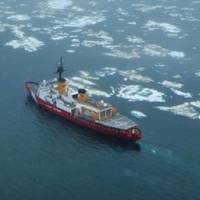
The U.S. Coast Guard Cutter 'Polar Star' is responding to a request from the Australian Maritime Safety Authority (AMSA) to assist the Russian-flagged passenger expedition ship 'Akademik Shokalskiy' and the Chinese-flagged icebreaker 'Xue Long' (which had earlier taken off the passengers from the 'Shokalsky' before becoming beset herself). The Polar Star leaves Sydney today after taking on supplies prior to its voyage to Antarctica, and it is anticipated it will take approximately seven days for the US Coast Guard Cutter to reach Commonwealth Bay, depending upon weather and ice conditions.
MV Akademik Shokalskiy Update
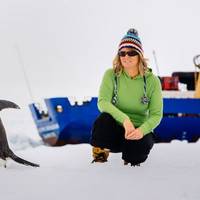
Rescue operations delayed by ice conditions. The Australian Maritime Safety Authority’s (AMSA) Rescue Coordination Centre (RCC Australia) has been advised this morning that sea ice conditions in the area are likely to delay today’s planned rescue of passengers from the MV Akademik Shokalskiy. It is now likely the rescue will not go ahead today. AMSA understands that current sea ice conditions prevent the barge from Aurora Australis from reaching the Chinese vessel Xue Long (Snow Dragon) and a rescue may not be possible today.
Antarctic Expedition Vessel Passengers to be Airlifted
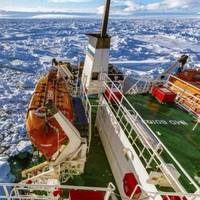
The latest news update from the Australian Maritime Safety Authority’s (AMSA) Rescue Coordination Centre (RCC Australia) informs that the Australian icebreaker 'Aurora Australis' is unable to reach the stranded 'Akademik Shokalskiy' as it would risk becoming beset itself if it continued with rescue attempts. Evacuation of passengers by helicopter is now planned. The Aurora Australis made attempts yesterday to reach the MV Akademik Shokalskiy but was driven back into open waters due to adverse weather conditions with winds up to 30 knots and snow showers causing poor visibility.
Weather Conditions Impact Antarctica Rescue
Adverse weather conditions have resulted in the Australian Antarctic Division (AAD) vessel Aurora Australis moving back into open water this afternoon. The area where the MV Akademik Shokalskiy is beset by ice is currently experiencing winds of up to 30 knots and snow showers. These weather conditions have resulted in poor visibility and made it difficult and unsafe for the Aurora Australis to continue today’s attempt to assist the MV Akademik Shokalskiy. Further attempts may be made by the vessel in due course to undertake the rescue once weather conditions improve. The Aurora Australis made it within 10 nautical miles of the MV Akademik Shokalskiy but is now located in open waters about 18 nautical miles east of the Russian vessel.
Latest on Ice-bound Antarctic Passenger Ship
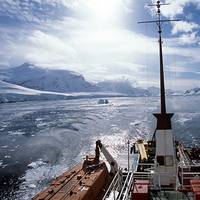
The Australian Antarctic Division (AAD) vessel 'Aurora Australis' is continuing to make its way to the Russian vessel beset by ice approximately 1500 nautical miles south of Hobart, reports the Australian Maritime Safety Authority’s (AMSA). The Aurora Australis, which was tasked by the Australian Maritime Safety Authority’s (AMSA) Rescue Coordination Centre (RCC Australia) to assist the MV Akademic Shokalskiy, is currently located about 11 nautical miles from the Russian vessel in the ice field.
Rescue for Ice-Beset Vessel Underway
First vessel approaching vessel beset in Antarctic ice The Australian Maritime Safety Authority (AMSA) is continuing the coordination of a search and rescue for a Russian vessel beset by ice approximate ly 1500 nautical miles south of Hobart. AMSA’s Rescue Coordination Centre Australia (RCC Australia) tasked three vessels with icebreaking capability to proceed towards the MV Akademik Shokalskiy, 100 nautical miles east of the French station Dumont D’Urville. The first of the three vessels tasked by RCC Australia is now about 15 nautical miles from the vessel, progressing at slow speed and the second vessel remains about 20 nautical miles away. Weather conditions improved on Friday, with strong winds and snow abating. Conditions are expected to remain favourable for the next two days.
Search and Rescue of Ice-trapped Passenger Vessel Underway
The Australian Maritime Safety Authority (AMSA) is coordinating a search and rescue for a Russian passenger ship beset by ice approximately 1,500 nautical miles south of Hobart. AMSA’s Rescue Coordination Centre Australia (RCC Australia) was contacted by the Falmouth Maritime Rescue Coordination Center (MRCC) in the United Kingdom on Christmas morning. The Falmouth MRCC received a distress message via satellite from a Russian flagged vessel, MV Akademik Shokalskiy, with 74 people about 7:20 a.m. (AEDT). The ship is in the Australian Search and Rescue region, 100 nautical miles east of the French base Dumont D’Urville. RCC Australia assumed coordination of the incident and issued a broadcast to icebreaking vessels in the area.
Satellite Phone Helps Rescue 82 From Ocean
Inmarsat's IsatPhone Pro alerts rescue services to assist passengers of a disabled Java Sea passenger boat. Australia Maritime Safety Authority's (AMSA's) Rescue Coordination Centre (RCC Australia) was contacted by Australian Federal Police after they recently received a distress call via IsatPhone Pro from a vessel requesting assistance. "RCC Australia successfully contacted the satellite telephone number and a person on board reported the vessel's engine was not working and there were 82 people on board. At this stage, the vessel's unconfirmed location was south of Java," explained AMSA's spokesperson Jo Meehan. RCC Australia sent…
About Australia's ETV in Rescue of Disabled Bulker 'ID Integrity'
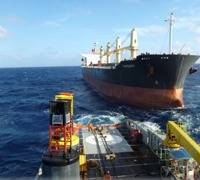
AMSA’s Thursday Island officer Adrian Davidson was on board ETV Pacific Responder when it was tasked to assist in the stabilisation and subsequent tow of the ID Integrity after it suffered engine failure in the Coral Sea on Friday 18 May. The Pacific Responder is the only designated emergency towage vessel is Australia and is located in the Great Barrier Reef and Torres Strait region. When it is not required for emergency response, it is used for training and survey purposes.
Disabled Bulk Ship Drifted Near Great Barrier Reef
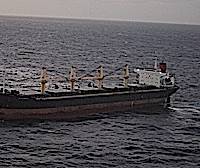
The Hong Kong-flagged bulk carrier, ID Integrity advised AMSA’s Rescue Coordination Centre (RCC Australia) that it had suffered an engine breakdown en route from Shanghai to Townsville. The unladen vesselwas drifting in a westerly direction towards Shark and Vema Reefs (approximately 175 nautical miles north-east of Cairns) while the crew attemped to repair the engine. The owners of the vessel dispatched two tugs to the scene. AMSA also tasked the Emergency Towage Vessel (ETV) Pacific Responder.
How Long Must the Tampa Wait?
Much has been said and written about the fate of the refugees aboard the Norwegian RoRo vessel Tampa and who's to blame. What has not been discussed is what the Tampa should have done or the international community's distressing response to the fate of not only the refugees but also to that of the Tampa's crew. At 1103 local time on Sunday, 26 August 2001 in Indonesian territorial waters, the Tampa received a call from the Rescue Coordination Centre (RCC) Australia asking it to rescue a fishing vessel in distress, as she was apparently the vessel closest. The Captain was told by RCC Australia that the ship was holding roughly 80 people.
Where There is No Safe Haven
There is a disturbing trend developing internationally that will surely be an agenda topping item for the International Maritime Organization in the coming year. At press time the Norwegian RoRo vessel Tampa, its crew of 27 and a reported 438 refugees — including 22 women and 43 children — was still in limbo. On Sunday, August 26, 2001 in Indonesian territorial waters, Tampa received a call from the Rescue Coordination Centre (RCC) Australia asking it to rescue a fishing vessel in distress, as she was apparently the closest vessel. The Captain was told by RCC Australia that the ship was holding roughly 80 people. The Tampa, which was built to accommodate 40 people safely, suddenly found herself having to rescue 438 people.





